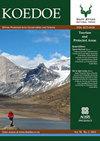Reflecting on research produced after more than 60 years of exclosures in the Kruger National Park
IF 1.1
4区 环境科学与生态学
Q3 BIODIVERSITY CONSERVATION
引用次数: 3
Abstract
Herbivores are a main driver of ecosystem patterns and processes in semi-arid savannas, with their effects clearly observed when they are excluded from landscapes. Starting in the 1960s, various herbivore exclosures have been erected in the Kruger National Park (KNP), for research and management purposes. These exclosures vary from very small (1 m2) to relatively large (almost 900 ha), from short-term (single growing season) to long-term (e.g. some of the exclosures were erected more than 60 years ago), and are located on different geologies and across a rainfall gradient. We provide a summary of the history and specifications of various exclosures. This is followed by a systematic overview of mostly peer-reviewed literature resulting from using KNP exclosures as research sites. These 75 articles cover research on soils, vegetation dynamics, herbivore exclusion on other faunal groups and disease. We provide general patterns and mechanisms in a synthesis section, and end with recommendations to increase research outputs and productivity for future exclosure experiments. Conservation Implications: Herbivore exclosures in the KNP have become global research platforms, that have helped in the training of ecologists, veterinarians and field biologists, and have provided valuable insights into savanna dynamics that would otherwise have been hard to gain. In an age of dwindling conservation funding, we make the case for the value added by exclosures and make recommendations for their continued use as learning tools in complex African savannas.反思在克鲁格国家公园进行了60多年的封闭后所产生的研究
草食动物是半干旱稀树草原生态系统模式和过程的主要驱动因素,当它们被排除在景观之外时,它们的影响可以清楚地观察到。从20世纪60年代开始,在克鲁格国家公园(KNP)建立了各种食草动物隔离带,用于研究和管理目的。这些封地从很小(1平方米)到相对较大(近900公顷)不等,从短期(单一生长季节)到长期(例如,一些封地建于60多年前),并且位于不同的地质和不同的降雨梯度上。我们提供了历史的总结和规格的各种外壳。接下来是系统地概述大多数同行评议的文献,这些文献是使用KNP封闭作为研究地点产生的。这75篇文章涵盖了土壤、植被动态、食草动物对其他动物群和疾病的排斥研究。我们在综合部分提供了一般模式和机制,并在最后提出建议,以提高未来封闭实验的研究成果和生产力。保护意义:KNP的草食动物封闭已成为全球研究平台,有助于培训生态学家,兽医和野外生物学家,并提供了对稀树草原动态的宝贵见解,否则很难获得。在一个保护资金日益减少的时代,我们提出了通过封禁增加价值的理由,并提出了在复杂的非洲大草原继续使用封禁作为学习工具的建议。
本文章由计算机程序翻译,如有差异,请以英文原文为准。
求助全文
约1分钟内获得全文
求助全文
来源期刊

Koedoe
BIODIVERSITY CONSERVATION-
CiteScore
3.30
自引率
0.00%
发文量
10
审稿时长
20 weeks
期刊介绍:
Koedoe, with the subtitle ''African Protected Area Conservation and Science'', promotes and contributes to the scientific (biological) and environmental (ecological and biodiversity) conservation practices of Africa by defining the key disciplines that will ensure the existence of a wide variety of plant and animal species in their natural environments (biological diversity) in Africa.
 求助内容:
求助内容: 应助结果提醒方式:
应助结果提醒方式:


